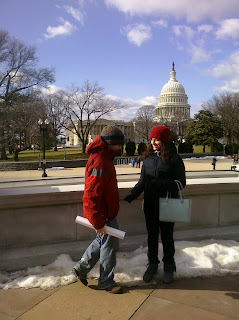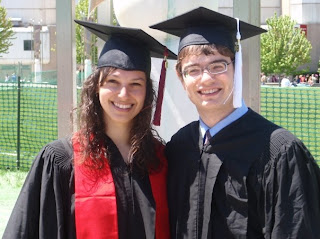
Saturday, June 12, 2010
Pomp and Circumstance

Sunday, June 6, 2010
The faces behind the flotilla

Thursday, June 3, 2010
Flotilla
Tuesday, May 18, 2010
Please send in your time sheet by Friday

Sunday, May 2, 2010
Right now, for now
Friday, April 9, 2010
What's the big deal?
Friday, April 2, 2010
Shirlington Village

Yesterday, Jeff and I looked at an apartment in Shirlington Village in Virginia. Though it’s just out of DC, it’d be a few metro stops and a 20 minute bus ride to get into the city.
The apartment was inconceivably beautiful, with a luxurious rooftop terrace, brand new cabinetry and appliances, a clubroom that looked like something out of a mansion and a workout room with personal televisions on all of the equipment. The leasing office treated us like royalty and we were drunk on indulgence.
Shirlington Village looked like something out of a storybook. Everything—restaurants, boutiques and bars—was new and crisp, down to the freshly laid bricks on the streets and sidewalks.
It had the charm of an old European town with the intrigue of the new and novel. It was perfect. A place a young girl always dreams of living with the one she’s going to marry.
I kept thinking, we could actually afford this. Sure it’s luxurious, but with its distance from the city combined with the dual income toward a one bedroom apartment, it wasn’t out of our price range.
The whole time we were there, I kept imagining bringing my parents to our new neighborhood. They’d be so impressed. She really made it, they’d think. I’d made it, I’d think.
I was so busy looking at designer clothes through store windows and reading restaurant names off awnings that I almost didn’t notice all the baby strollers and toddlers.
That’s when we realized what we’d be giving up by moving to this amazing apartment and this beautiful village—the rest of our youth.
If we lived so far away from the city, we’d probably rarely venture to DC for drinks with friends after work, and nights out on weekends. We probably wouldn’t have much opportunity to host friends from the city at our apartment. We’d make friends, but they’d most likely live near us, and would probably be older and maybe even have children.
We had a choice to make. Luxury verses location. Settling down verses relishing the last few years we have left of our youth.
Once we were out of the Shirlington Village, its spell released us fairly quickly and the decision was easy. Location. Nearby metro. Washington D.C.
I still plan on bringing my family to Shirlington Village when they visit. I know they’ll love it just as much as I did, and I can tell them Jeff and I will live here, one day, when we’re ready.
Wednesday, March 24, 2010
Good for the Jews
Thursday, March 18, 2010
How to remember a tragedy

When I saw the trailer for Robert Pattinson movie, "Remember Me," the only thing that caught my attention was how many 13-year-old girls were going to rob their parents blind seeing it eight times in theaters. Like my proceeding generation's "Titanic," minus the Oscars.
Tuesday, March 9, 2010
Where do we go from here?

It doesn't matter how smart, strong or mature you are. Serious decisions are some of the most difficult challenges we all has to face.
Thursday, March 4, 2010
Good for the Jews (continued)
Monday, March 1, 2010
Good for the Jews

I finally started "Good for the Jews" in time for purim. The book arrived in the mail and I finished my previous book just in time to start on this modernized Purim story last weekend. It was a complete coincidence. I'm not that organized and I'm not that cute.
Friday, February 26, 2010
Freedom of speech?

Wednesday, February 17, 2010
On the slopes

At my Bat Mitzvah, my dad made a speech about skiing. He probably doesn't know how vividly I remember it, and I don't think I ever told him how much it meant to me. I was never good with that mushy stuff.
Saturday, February 13, 2010
J-Date: couple looking for a relationship

There are tons of advantages to meeting your sigificant other young. I met Jeff when I was 20, and we were only sophomores in college. For some people, this may be too young to commit yourself to one person, but we were ready.
There’s only one aspect of young adult Jewish dating I feel I might have missed out on: J-Date.
I’ve known about J-Date since high school, when my friends and I would giggle while we checked the listings to see the profiles of the Jewish single adults we knew.
Then we grew up and I had a boyfriend and my friends gained entry into the world of online dating that I’ll never know.
But it’s not the hundreds of eligible bachelors at your fingertips, the chatting or the excitement of someone new making contact that has me intrigued—it’s the long-term friendships that seem to come out of it more often than the romances.
After we graduated last spring, I watched friends of mine move to new cities and join J-Date looking for either the loves of their lives or just a fling to ease the transition.
What happened was my friends started going out. They met different kinds of people and were escorted to different kinds of places. Sometimes there were flings, sometimes there was nothing, and sometimes they vowed to just stay friends. And they did. They met friends of friends and soon their social lives were booming in a new city.
Back in Madison, Jeff and my friends are slowly dispersing. It’s cold, and there’s not much motivation to go out and meet people when the alternative is cozying up in the apartment together, not alone.
But we don’t want to look back and realize we turned 80 half a century prematurely. We’re under 25. We should be out and having fun with our friends, but how do we find friends in a world where dating post college seems to be a prerequisite for friendship?
Someone needs to make a J-Date for young couples looking to meet other couples. But in the mean time, I’ll get the tea, Jeff’ll set up the board games and the guinea pigs will squeal in delight at the prospect of another Saturday night with their parents.
Monday, February 8, 2010
Jewish women at the Super Bowl

Wednesday, February 3, 2010
And the nominees are

As the Jewish Journal points out, three of the 10 films up for best picture this year have Jewish themes or undertones. I haven't seen "A Serious Man," but I saw both "Inglourious Basterds" and "An Education" in theaters.
Sunday, January 31, 2010
Good for the Jews

I just ordered "Good for the Jews" by Debra Spark. It's a modernized version of the story of Esther based in Madison, Wisconsin. It was published by the University of Michigan press and the author lives in Maine.
Tuesday, January 26, 2010
Rewriting history?

Not sure how I feel about this. Long story short, Tzemah Yoreh, son of Talmud scholars and assistant professor of Bible at American Jewish University in L.A., served in the Israeli army and wasn't impressed. He said the experience "destroyed my ardent Zionism" and made him an athiest.
Still committed to his Jewish upbringing, Yoreh decided to rewrite the siddur and drafted his own atheist-feminist version that eliminates God and Zionism from the mix.
I don't know I'd go as far as to call myself an atheist. I don't vehemently deny the existence of God, but I'm not really convinced either. One of my favorite things about Judaism is that its so strongly rooted in culture and tradition that a core belief in God isn't necessary to feel connected.
My boyfriend's sitting right next to me and I haven't showed him yet, but I know it'll make him cringe. He'll say changing century old traditions undermines the religion. Jeff and I feel pretty much the same way about God, but for him, Judaism is about keeping the same traditions as our ancestors and the other Jews around the world to stay connected to each other as a religion and a culture.
I understand that, but I don't completely agree with it. I think it's ok when we develop new tunes to prayers, or modify laws to keep up with the times.
I have a hard time respecting anyone's work in Judaism who doesn't support Israel, but Yoreh had kind of a cool idea. He said, “If you define [prayer] as communication between humans and a deity, I think that’s a very narrow conception. . . I think prayer is communal and private expression of hopes, fears, an appreciation of aesthetic beauty, good attributes. But that has nothing to do with God.”
I like that. I don't pray to God because it doesn't really do anything for me, but broadening the meaning of prayer might open things up a bit for people like me.
I think it'd be cool to read his siddur, but more as something to study than something to use in synagogue. In that sense I think Jeff's right. I may not believe in God, but having a God at the center of Judaism is part of the tradition and part of the culture that have defined so much of my life.
Sunday, January 24, 2010
Sick days

This weekend I stayed home sick and Jeff stayed to take care of me. Luckily, we got digital cable installed on Saturday, so both us and our guinea pigs made it out of the weekend alive.
Wednesday, January 20, 2010
I'm from Canada

We all at least know someone who's done it. Where are you from? I'm from Canada, you say, hoping this will up your chance of getting accurate directions through Europe.
You don't say it because you hate America, or even because you're ashamed of it.
You say it because the international opinion of the United States, particularly in Europe, is frighteningly low. Granted it's better now that Obama is president, but as far as I can tell, not by much.
I was just as angry and frustrated as every other young liberal when Bush was president. I would point to stretch Hummer limousines and shake my head and say, that's what's wrong with America.
I would laugh at the ignorance of people who said it's our duty as citizens to support our president in any decision he made because he's the leader of our country. I still do. I think it's scary that people believe that.
But when it comes to Israel, I have always defended it. The government, the army and the citizens, even when I don't know the details of the action or event I'm defending. When people say bad things about Israel, I get flustered and angry and scared.
How does that make me any different than the unconditional Bush supporters I can't stand?
I asked my Israeli "sister," Meital, what the young adult political climate was like in Israel awhile ago. Meital lived with my family in Milwaukee in 2004 as part of the Young Emissary Program. I wrote about her for my first article during my internship at the Chronicle. We've seen each other several times since her stay, and she remains a close part of our family.
Basically, she told me young political life in Israel is a lot like it is here. There are a lot of people like me, herself included, who question what the government does and openly criticize it when they think it's done something wrong.
This didn't surprise me, but it made me wonder what the Israeli youth thought about their Jewish American counterparts who criticize the American government but never the Israeli one.
But then she said something that did surprise me. She told me that she becomes more defensive regarding her country when she's in someone else's. She was visiting me in Madison at the time and working in Puerto Rico, where she still is.
I realized that it's the same for me, though. The worst was when I was in London in the summer of 2006. There was anti-American propaganda everywhere, and oddly enough, I never felt more pride in my country.
Maybe when you're away is when it's most obvious how much hate is actually out there.
I've only been to Israel once, but for a number of reasons--particularly the Israelis in my life-- it feels like home.
Because of this, I am constantly on guard when it comes to Israel. I have no problem scrutinizing the country's actions in the company of other people, Jewish or not, who unconditionally believe in Israel's right to exist as a Jewish country, and I have no problem admitting to these people when I don't know enough to form a valid opinion.
But just as I would never say anything bad about the United States to someone who looks down on Americans as spoiled and inferior beings, I will continue to support Israel unconditionally in the face of people who don't think the Jews have a right to a homeland.
I've never actually told anyone I was from Canada, but I know people who have, and I guess I don't blame them. When it's dark and you're lost on another continent, sometimes it's just not worth risking it.
But a lot of times it is. I'm usually more of a cynic than an idealist, but I can't help but think that if young Jews, especially Jewish liberals, stood up more for their religion and their country, it wouldn't hurt.
Monday, January 18, 2010
A note on the Wisconsin Jewish Chronicle
I'm Kind of Kosher

